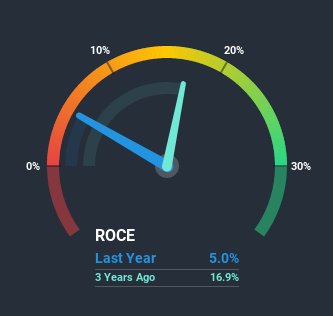- South Korea
- /
- Chemicals
- /
- KOSE:A006650
Our Take On The Returns On Capital At Korea Petrochemical Ind (KRX:006650)
There are a few key trends to look for if we want to identify the next multi-bagger. Amongst other things, we'll want to see two things; firstly, a growing return on capital employed (ROCE) and secondly, an expansion in the company's amount of capital employed. Put simply, these types of businesses are compounding machines, meaning they are continually reinvesting their earnings at ever-higher rates of return. Although, when we looked at Korea Petrochemical Ind (KRX:006650), it didn't seem to tick all of these boxes.
What is Return On Capital Employed (ROCE)?
For those who don't know, ROCE is a measure of a company's yearly pre-tax profit (its return), relative to the capital employed in the business. To calculate this metric for Korea Petrochemical Ind, this is the formula:
Return on Capital Employed = Earnings Before Interest and Tax (EBIT) ÷ (Total Assets - Current Liabilities)
0.05 = ₩99b ÷ (₩2.1t - ₩85b) (Based on the trailing twelve months to September 2020).
Therefore, Korea Petrochemical Ind has an ROCE of 5.0%. Ultimately, that's a low return and it under-performs the Chemicals industry average of 8.0%.
View our latest analysis for Korea Petrochemical Ind

Above you can see how the current ROCE for Korea Petrochemical Ind compares to its prior returns on capital, but there's only so much you can tell from the past. If you're interested, you can view the analysts predictions in our free report on analyst forecasts for the company.
The Trend Of ROCE
On the surface, the trend of ROCE at Korea Petrochemical Ind doesn't inspire confidence. To be more specific, ROCE has fallen from 19% over the last five years. However it looks like Korea Petrochemical Ind might be reinvesting for long term growth because while capital employed has increased, the company's sales haven't changed much in the last 12 months. It's worth keeping an eye on the company's earnings from here on to see if these investments do end up contributing to the bottom line.
On a related note, Korea Petrochemical Ind has decreased its current liabilities to 4.1% of total assets. That could partly explain why the ROCE has dropped. What's more, this can reduce some aspects of risk to the business because now the company's suppliers or short-term creditors are funding less of its operations. Since the business is basically funding more of its operations with it's own money, you could argue this has made the business less efficient at generating ROCE.
The Bottom Line On Korea Petrochemical Ind's ROCE
Bringing it all together, while we're somewhat encouraged by Korea Petrochemical Ind's reinvestment in its own business, we're aware that returns are shrinking. Although the market must be expecting these trends to improve because the stock has gained 49% over the last five years. Ultimately, if the underlying trends persist, we wouldn't hold our breath on it being a multi-bagger going forward.
Like most companies, Korea Petrochemical Ind does come with some risks, and we've found 2 warning signs that you should be aware of.
While Korea Petrochemical Ind may not currently earn the highest returns, we've compiled a list of companies that currently earn more than 25% return on equity. Check out this free list here.
When trading Korea Petrochemical Ind or any other investment, use the platform considered by many to be the Professional's Gateway to the Worlds Market, Interactive Brokers. You get the lowest-cost* trading on stocks, options, futures, forex, bonds and funds worldwide from a single integrated account. Promoted
Valuation is complex, but we're here to simplify it.
Discover if Korea Petrochemical Ind might be undervalued or overvalued with our detailed analysis, featuring fair value estimates, potential risks, dividends, insider trades, and its financial condition.
Access Free AnalysisThis article by Simply Wall St is general in nature. It does not constitute a recommendation to buy or sell any stock, and does not take account of your objectives, or your financial situation. We aim to bring you long-term focused analysis driven by fundamental data. Note that our analysis may not factor in the latest price-sensitive company announcements or qualitative material. Simply Wall St has no position in any stocks mentioned.
*Interactive Brokers Rated Lowest Cost Broker by StockBrokers.com Annual Online Review 2020
Have feedback on this article? Concerned about the content? Get in touch with us directly. Alternatively, email editorial-team (at) simplywallst.com.
About KOSE:A006650
Korea Petrochemical Ind
Engages in the production and supply of petrochemicals in Korea and internationally.
Undervalued with moderate growth potential.
Similar Companies
Market Insights
Community Narratives




